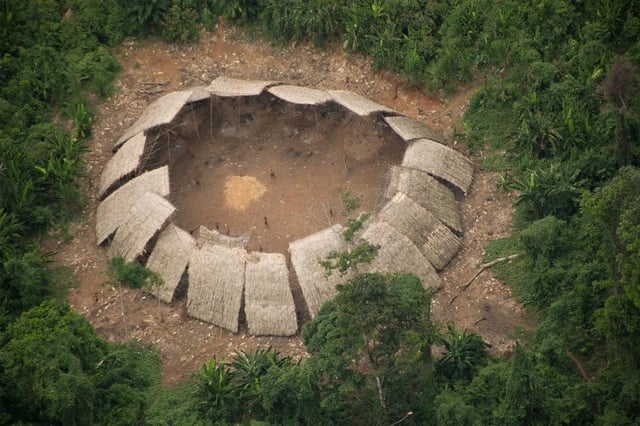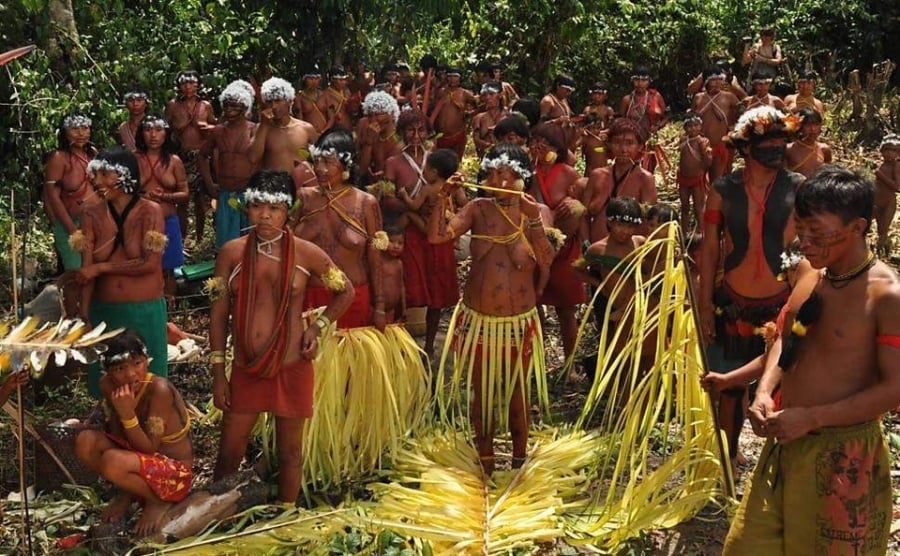The Yanomami Tribe: Earth’s Last “Forest People”
Hidden deep within the Amazon rainforest, straddling the border between Venezuela and Brazil, the Yanomami tribe lives in complete isolation from the modern world. With a population of around 20,000, they are considered one of the last communities to maintain the wild lifestyle of their ancestors. They have no phones, no internet, and remain untouched by modern technology.
The Yanomami survive by hunting, gathering, and farming. They have an intimate knowledge of every plant and animal in the forest, turning nature into a sustainable source of life. But what makes this tribe unique are the strange customs they have maintained for centuries.

Ash-Eating Ceremony: Connecting Life and Death
One of the most intriguing Yanomami customs is their practice of “eating the ashes of the dead.” In their belief system, the soul persists after death, and as long as the physical body is well-protected, the soul can rest in peace and move on to the next life.
When a member of the tribe passes away, the most respected man performs a ritual cleansing of the body using water boiled from forest leaves. All personal belongings of the deceased are then meticulously cleaned. The body is placed on a pile of dry wood and cremated, a process that lasts throughout the day and night under careful supervision to ensure complete incineration.
Once the ashes have cooled, they are ground into a fine powder, stored in dried gourds, and placed in the most honorable spot in the house. A year later, these ashes are used as a seasoning or incorporated into a dish, typically a banana soup. The ashes are mixed with mashed bananas, cooked, and shared among tribe members.
According to ethnological studies, “ash-eating is not only a spiritual act but also a way to maintain a connection with deceased loved ones,” quotes Dr. Maria Gonzalez, a specialist in South American indigenous cultures, from National Geographic.
However, if the deceased was killed by an enemy, only the women of the tribe are allowed to consume the ashes. This act symbolizes protecting the soul from external intrusion.

The Harsh Coming-of-Age Ceremony for Yanomami Girls
The Yanomami are also renowned for their coming-of-age rituals, particularly the harsh ceremony endured by young girls aged 10-12. This month-long ordeal involves confinement in a small cage and deprivation of food and water during the first week. Afterward, they are released, their bodies painted with traditional symbols, and presented to the tribal elders as a sign of their maturity.
“This ritual is not only an endurance test but also affirms the role of women in the community,” says Professor John Smith, a specialist in indigenous cultures, quoted from the BBC.
Daily Life of the Yanomami
The Yanomami have a clear division of labor between men and women. While men take on hunting and fighting, women tend to the gardens and raise the children. They are knowledgeable about nature and use their ancestral wisdom to create weapons and poisons from plants.
Yanomami men are known for their warlike nature, readily confronting any perceived threat. However, they are also highly united, always prioritizing the well-being of their community.

Conclusion: Lessons from the Yanomami
The story of the Yanomami tribe stands as a testament to the cultural diversity of humanity and a reminder of the value of unity and respect for traditions. Even in this age of rapid technological advancement, we can learn from their harmony with nature and preservation of precious spiritual values.
What are your thoughts on the Yanomami’s unusual customs? Do you find them fascinating or perplexing? Feel free to share your reflections.
































